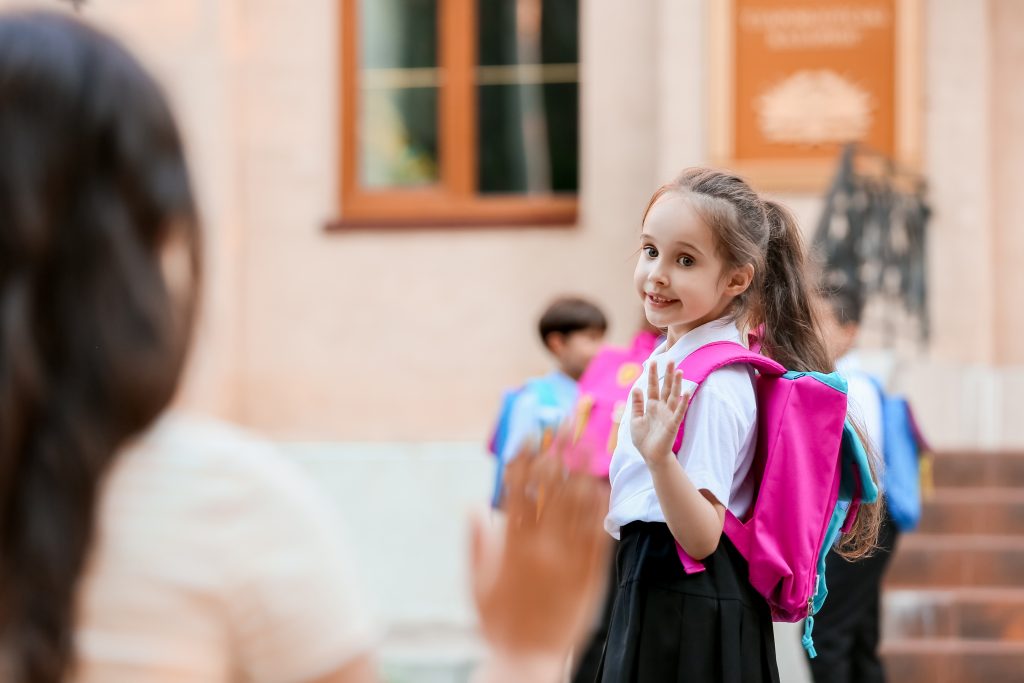10 tips to help your child feel less anxious about starting school

Just like that, school holidays are coming to an end and the 2022 school year is about to begin. Those that are returning know the drill but those newbies starting Kindy or Prep are in unknown territory. Some children will be full of excitement and looking forward to their new journey. Whilst for others, the change will bring about some anxiety and they may worry at every small detail.
As a parent we’d like our child to have a transition to school that is smooth and full of lovely fun memories. The reality is this won’t be the case for all children but there are a number of things we can do to decrease the anxiety of those more nervous children.
Here are 10 things you can do to help your anxious child in the transition to ‘big’ school.
Validate their feelings
It is so important to validate our children’s feelings when they are feeling anxious and to use reflective listening to discuss what is worrying them. Whilst well meaning, telling children “It will be fine” doesn’t leave them feeling heard.
Acknowledge and listen to their worries and let them know it is completely normal to feel nervous about starting school. The uncertainty and unknown can bring up many concerns for little ones when embarking on a new experience. It’s important for children to know that even adults experience nerves when doing something they haven’t done before. It is totally normal. Sharing one of your own appropriate experiences can help.
What would you do scenarios
If your child has specific worries about starting school, running through a problem-solving technique on how to manage such situations can help alleviate their anxieties. Many of the worries we have don’t actually eventuate but having a toolbelt of potential solutions for their main concerns may help them to feel ready to tackle their worries should they arise. Talk to your child about their worries and have them pick one to start with. With your child, brainstorm some solutions together for a few of their worries. This isn’t about highlighting potential threats but addressing their specific concerns in a safe environment.
Back to a bedtime routine at least week prior
For many, the summer holidays mean less sleep due to the longer days and warmer nights. Sleep is such an integral part of a child’s wellbeing and is essential for good concentration and emotional regulation. We’ve all heard about the importance of good sleep hygiene and routine for our children’s slumber, but the benefits of quality sleep don’t happen in just one night. Start your child’s school sleep routine at least a week prior to reset your child’s circadian rhythm in order to improve their sleep before the first day.
Nightly meditation is a great tool to introduce to children to from a young age to improve sleep. Not only can meditation help with relaxation before bedtime resulting in shorter timeframe in falling asleep, it also improves our quality of sleep when practiced regularly.
Put on uniform and role play
Have some fun together role-playing schools. Have your child put on their uniform, pack a lunch box and their bag, and pretend you are at school. If your child has specific concerns or worries you could build these into your game. Otherwise, just have fun getting your child excited and feeling the part, just like they will when they are their new school. Sap roles and have your child play teacher as well so you can get an idea of what they expect or any concerns they haven’t shared.
Build on your connection
Children thrive on secure bond. Spending some extra time together in the week leading up to school to build on the bond you share with your child can help them feel more confident about the change. Perhaps it’s a special one on one lunch or park date or something special your child would love. Ensure to add some extra time, even just 10 minutes, both before and after school in those early weeks to keep the security and connection stay strong.
Role model calm and confident
As a parent we need to be aware of our own stress levels. If we want to help calm our anxious child, we can only do so from a place of calm within ourselves. If the start of the school year has your own anxiety levels rising, be sure you take the time to calm your sympathetic nervous system with some deep belly breathing, before attempting to help your child calm theirs. Ensure that you are practicing self-care and talking to someone you trust if this milestone is stirring up some big emotions. It can be a big thing for parents too, especially if it is your first child going to school.
Teach your child some calming techniques
Stress and worry are a part of life but that doesn’t mean you are helpless to its effect on you. Teaching our children from a young age the techniques that will help them calm their nerves is a lifelong skill. Simple belly breathing (taking your breath all the way into your belly like you are filling a balloon) for a couple of minutes – breathing in for the count of 3 and breathing out for the count of 3 – can be a simple, yet effective strategy to calm our body.
Another simple technique is box breathing. This is where you breathe in for the count of 4, hold for the count of 4, breathe out for 4 and hold for 4, before starting again.
A more hands on technique that can be helpful for littlies is finger breathing. Starting on the outside of the little finger with the index finger of the opposite hand, slowly trace up as you breathe in, hold at the tip of finger for a second or two, and then slowly trace down your finger as you exhale. Continue along each finger until you finish with the thumb.
Lay their clothes out night before
To avoid a rush and potentially heightening anxiety, ensure that you organise what you can the night before. Lay out your child’s uniform, make their lunch and pack what you can into their bag. Having your child help with as much of this as possible can build their excitement.
If your child has a brand-new pair of shoes, make sure they have been worn in for a few days to minimise the chance of blisters on day one.
Comfort and connection for the day
Some children, no matter how connected and prepared they are for school, will still have anxieties and worries about separating from their loved ones starting school. It can be nice for those feeling apprehensive to have some form of comfort on day one that helps them feel like they are connected to the parents. There are a few ideas that may appeal to your child. A worry doll or stone to keep in their pocket as a comfort, a little friend to see the day through. A kiss on your hand and theirs, drawn with a little heart on both hands. You can also use a fabric heart or piece of material with your perfume on it, even a simple handwritten note they can keep with them or in their bag.
Don’t overdo the after-school activities
Starting school is a big adjustment and can leave children tired and irritated during the first few weeks, if not first term. Whilst we all want our kids to get involved in their favourite sports, swimming lessons and other creative endeavours, starting school is exhausting enough without a full schedule of after school activities. It is essential that children have a few days of downtime after school to just be and unwind from this new and stimulating experience.
It’s an exciting time for both kids and parents but as with anything new it’s normal to have some nerves. Frame school as a positive experience to look forward to without over doing it. They may be nervous, but they will overcome it. Remind them of another positive experience they were initially nervous about and how well that turned out. Above all, lots of love and reassuring cuddles.
To learn more about how your child can cope with worries and build resilience in their everyday life, check out the Peaceful Kids programs currently available in your area. For more information visit my website or Peaceful Kids Classes.
